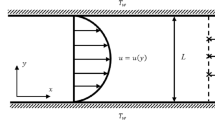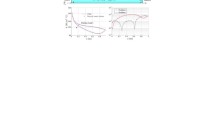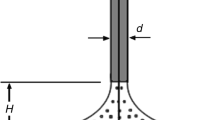Abstract
A conjugate heat transfer problem of steady laminar flow in a circular pipe with a thick wall is considered for estimating inlet conditions of fluid flow in a thick pipe. An inverse method is used to estimate the unknown velocity and temperature of the fluid at the inlet of the pipe based on temperature data obtained on the outer surface along the pipe's length by subjecting the pipe's outer surface to uniform heat flux. Simulations are run for two-dimensional steady laminar flow in COMSOL for different data sets of inlet velocity and inlet temperature to obtain the temperature data along the length of the pipe. Then the curve is fitted using this data by using nonlinear regression analysis with the Bayesian framework. This fitted curve acts as a forward model for estimating the flow conditions at the inlet. The simulated and surrogated temperatures are compared using a Bayesian framework for the guess sample of parameters. To sample the parameter space of inlet conditions (vi, Ti) of fluid flow, Metropolis–Hastings algorithm has been used. Point estimates of v and T and their associated standard deviation (SD) are estimated.
Access this chapter
Tax calculation will be finalised at checkout
Purchases are for personal use only
Similar content being viewed by others
Abbreviations
- h:
-
Heat transfer coefficient (w/m2 K)
- k:
-
Thermal conductivity (w/m K)
- MCMC:
-
Markov Chain Monte Carlo
- MH:
-
Metropolis–Hastings
- r:
-
Radius (m)
- v:
-
Velocity (m/s)
- T:
-
Temperature (K)
- α:
-
Thermal diffusivity (m2/s)
- i:
-
Inlet
- in:
-
Inner
- out:
-
Outer
References
Huang C-H, Yan J-Y (1995) An inverse problem in simultaneously measuring temperature-dependent thermal conductivity and heat capacity. Int J Heat Mass Transfer 38(18):3433–3441
Znaidia S, Mzali F, Sassi L et al (2005) Inverse problem in a porous medium: estimation of effective thermal properties. Inverse Prob Sci Eng 13:581–593. https://doi.org/10.1080/17415970500098337
Mota CAA, Orlande HRB, De Carvalho MOM et al (2010) Bayesian estimation of temperature-dependent thermophysical properties and transient boundary heat flux. Heat Transfer Eng 31:570–580. https://doi.org/10.1080/01457630903425635
Ghosh S, Pratihar D, Maiti B et al (2011) Inverse estimation of location of internal heat source in conduction. Inverse Prob Sci Eng 19:337–361. https://doi.org/10.1080/17415977.2011.551876
Beck JV, Arnold KJ (1977) Parameter estimation in engineering and science. Wiley series in probability and mathematical statistics. Wiley, New York (NY)
Reddy BK, Balaji C (2015) Bayesian estimation of heat flux and thermal diffusivity using liquid crystal thermography. Int J Therm Sci 87:31–48
Gnanasekaran N, Balaji C (2013) Markov Chain Monte Carlo (MCMC) approach for the determination of thermal diffusivity using transient fin heat transfer experiments. Int J Therm Sci 63:46–54
Kaipio J, Somersalo E (2007) Statistical inverse problems: discretization, model reduction and inverse crimes. J Comput Appl Math 198:493–504
Siekmann I, Wagner LE II, Yule D, Fox C, Bryant D, Crampin EJ, Sneyd J (2011) MCMC estimation of Markov models for ion channels. Biophys J 100:1919–1929
Kim SK, Lee II W (2002) An inverse method for estimating thermophysical properties of fluid flowing in a circular duct. Int Commun Heat Mass Transfer 29(8):1029–1036. https://doi.org/10.1016/S07351933(02)00431-1
Lu T, Han WW, Jiang PX, Zhu YH, Wu J, Liu CL (2015) A two-dimensional inverse heat conduction problem for simultaneous estimation of heat convection coefficient, fluid temperature and wall temperature on the inner wall of a pipeline. Prog Nuclear Energ 81:161–168
Han WW, Chen HB, Lu T (2019) Estimation of the time-dependent convective boundary condition in a horizontal pipe with thermal stratification based on inverse heat conduction problem. Int J Heat Mass Transf 132:723–730
Lih CW, Ching YY, ** CW, Long LH (2008) Inverse problem of estimating transient heat transfer rate on external wall of forced convection pipe. Energ Convers Manage 49(8):2117–2123
Hastings WK (1970) Monte Carlo sampling methods using Markov chains and their applications. Biometrika 57(1):97–109
Author information
Authors and Affiliations
Corresponding author
Editor information
Editors and Affiliations
Rights and permissions
Copyright information
© 2024 The Author(s), under exclusive license to Springer Nature Singapore Pte Ltd.
About this paper
Cite this paper
Dinesh Reddy, K., Konda Reddy, B. (2024). Estimation of Inlet Conditions of Fluid Flow in a Thick Pipe Using Inverse Technique. In: Singh, K.M., Dutta, S., Subudhi, S., Singh, N.K. (eds) Fluid Mechanics and Fluid Power, Volume 6. FMFP 2022. Lecture Notes in Mechanical Engineering. Springer, Singapore. https://doi.org/10.1007/978-981-99-5755-2_2
Download citation
DOI: https://doi.org/10.1007/978-981-99-5755-2_2
Published:
Publisher Name: Springer, Singapore
Print ISBN: 978-981-99-5754-5
Online ISBN: 978-981-99-5755-2
eBook Packages: EngineeringEngineering (R0)




